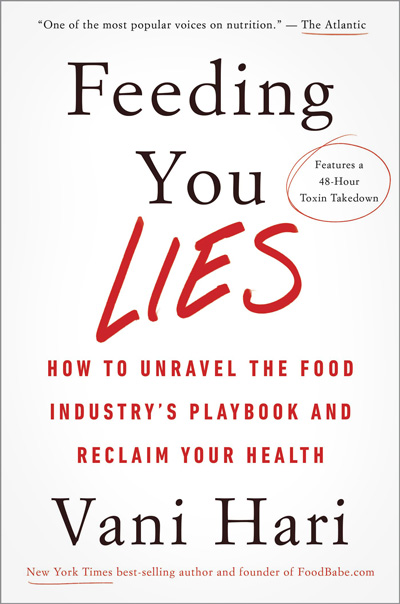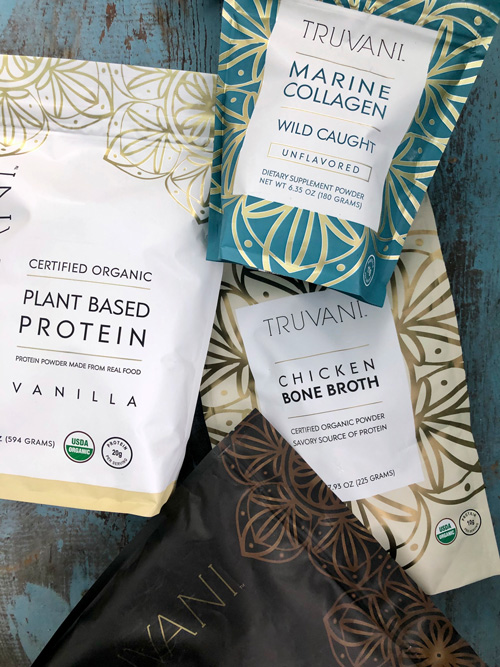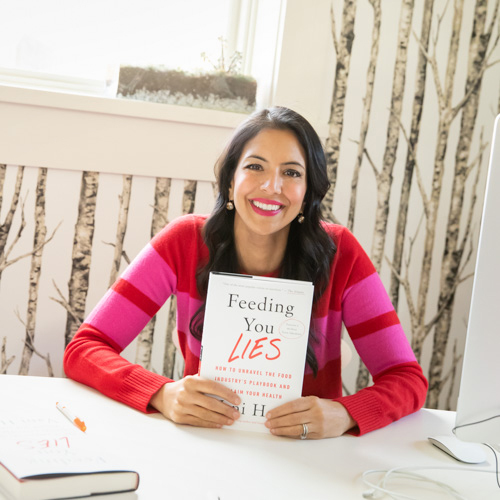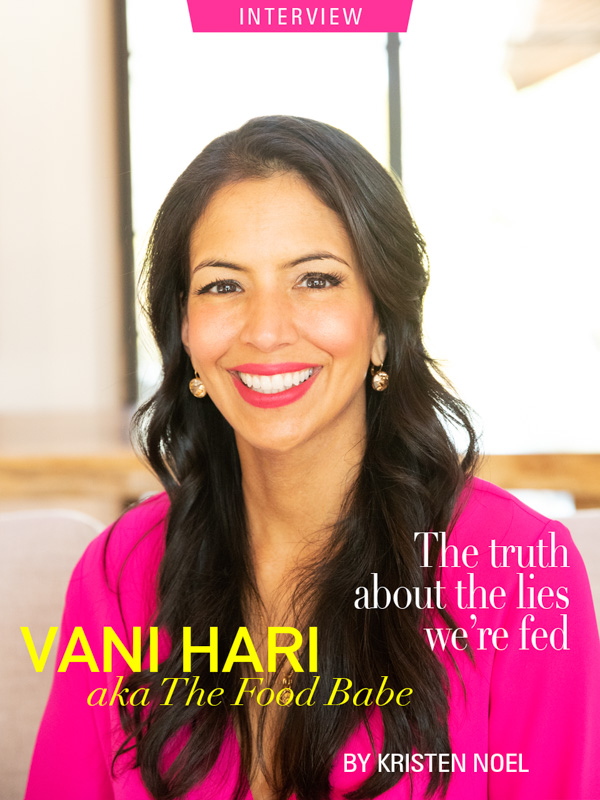
January 4, 2019, Charlotte, NC
Inconvenient facts are still facts.
—Vani Hari, aka Food Babe
Kristen: Vani Hari, otherwise known as ‘The Food Babe’, is a revolutionary food activist and New York Times best-selling author. She was named one of the ‘30 Most Influential People on the Internet’ by Time magazine. A reformed sugar addict, soda drinking, fast food eater, Vani went from starting a food blog in 2011 documenting her own journey to health to calling the Big Food industry to task.
A woman on a mission for truth and transparency from the food industry and those who regulate it, Vani has initiated a movement of accountability and enlisted a mass of supporters in excess of 1M called the ‘Food Babe Army’. She has been widely profiled, including the New York Times, The Atlantic, Financial Times and the Wall Street Journal, as well as appearing on CBS News, CNN, Fox News, and the Dr. Oz show.
Vani is the founder of Truvani, a startup company offering real food without chemicals, products without toxins, and labels without lies. In her latest book, Feeding You Lies: How to Unravel the Food Industry’s Playbook and Reclaim Your Health — she blows the lid off what goes on behind the scenes while paving a new way of thinking for us all to approach our own health options. She shines the light so that we can become our own nutritional advocates and truth detectors.
Vani, thank you for sitting down with Best Self Magazine today and for inviting us into your home — and mostly, for your crusading voice in the world.
Vani: It is a pleasure to have you in my home. I’ve been a big fan of yours and what you’re bringing forth through Best Self.
Kristen: Thank you, this is a long time in the making. I’ve wanted to sit down with you for a while.
For anyone in our audience that isn’t familiar with your work, I would love it if you could take us through your journey from fast food to hospital bed to food maven. That’s quite an arc. Was there a specific incident where you connected the dots and identified food as the culprit?
Vani: I grew up here in Charlotte, North Carolina with two immigrant Indian parents. The first thing my Dad actually introduced my Mom to — after they had an arranged marriage in India and came here for their honeymoon — was a McDonald’s hamburger. He felt that if they were going to live in America they were going to eat like Americans. That’s essentially how I was raised. We were one of the only Indian families in my school growing up, so I wanted to eat what everybody else around me was eating. As a result, I completely shunned my mother’s homemade cooking.
I wanted to eat the chicken nuggets, and Salisbury steak, and fried mozzarella sticks — and all the stuff that my peers were eating. The food that my Mom was making smelled funny, it was weird tasting, and my brother wouldn’t eat it. We ate a lot of fast food, probably three or four times a week if not more, because it was cheap, and it was available, and because my parents didn’t really understand what was happening with the American food suppliers. This was never an issue in India because everything was made from scratch there, and everything had medicinal spices and was truly healthy.
As a result of this processed food lifestyle, I was very sick as a child. I had eczema, asthma, allergies, and was always at the doctors getting a prescription drug, going on antibiotics. I was just a sickly child who never wanted to go to school because I didn’t feel well.
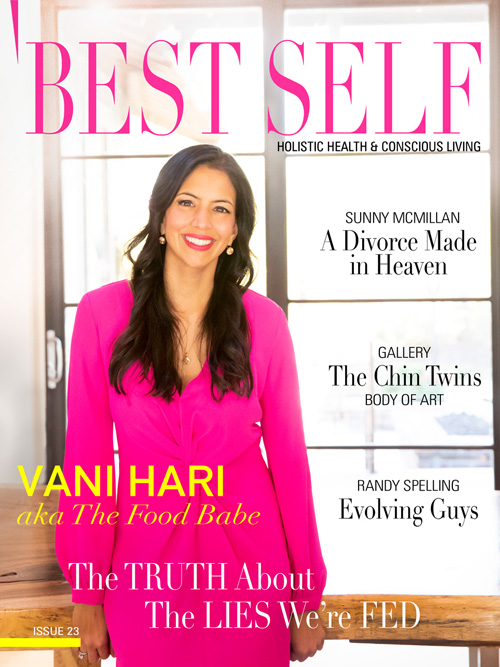
But it wasn’t until my early twenties that I completely hit rock bottom. I had been working in a high-powered job where they give you an expense account. I was traveling all over the place and they were catering breakfast, lunch, and dinner so we could work through our meals. The reality: I was letting my food be outsourced by this company.
I had a lot of ambition. When you have Indian parents, they expect you to get a good job, a 401K, and health insurance; I was just trying to live up to that idea.
Not surprisingly, my health just went down the toilet. I not only gained close to 40 pounds, I felt horrible about myself. I also ended up in the hospital with an appendicitis. Even to this day, it is widely assumed that an appendicitis is something that just happens randomly to people. But it’s an organ in your body that is connected to your digestive system — and when it becomes inflamed it usually results in an appendectomy.
Kristen: Yeah, just take it out. [being sarcastic]
Vani: Yes, and they also say you don’t need it. But actually the science today talks about how you do in fact need your appendix. It actually produces beneficial gut bacteria for your body and probiotics.
Going through this experience in December 2002, in which it took me over a month to recover, became a monumental moment. It was then that I made a commitment to myself and said, You know what? I’m not going to let any boss, job, or anything get in my way. I’m going to learn how to be healthy. I’m going to start by taking control of my food.
The first thing I did was channel all of this energy and experience that I learned in high school — where I was a top-tier, nationally ranked debater — and put it to work in a new way.
Kristen: That’s no surprise to me. Those skills sure came in handy. [laughing]
Vani: Yes, they actually did come in handy. Back when I was doing debate we didn’t have Google. We didn’t have the Internet to go find information. We had to go do the legwork, physically go to these law libraries, get the microfiche and print all this stuff out — and then carry these big tubs of evidence all across the country to all these debate tournaments. One year in high school, our debate topic was health care. I was learning all of these topics about health and using that to win debate rounds, but wasn’t applying any of that information to my own body.
Kristen: Yet! But it certainly was planting seeds for what was to come…
Vani: I realized that I needed to figure this nutrition thing out. One of the first books I came across was Gabriel Cousens’ Conscious Eating. It’s this big, thick book that I still have today. It’s still an amazing bible on how to eat. One of the concepts that he talks about is how the majority of food on shelves in grocery stores is ‘dead food’.
Dead = processed food that is not alive. It doesn’t really serve any nutritional purpose for your body.
That really rang home with me in a big way. So I started to investigate the ingredients that I’d been eating and the foods that I had made part of my daily diet. One of these foods was Chick-fil-A. It was considered a healthier, cleaner fast food and I was eating it all the time.
But it wasn’t until I really began to understand what was behind some of these fast food items, that a lot of these ingredients, even in the ones that are claimed ‘healthy’, or safe, or cleaner, were really the same chemicals that you’d find in McDonald’s, Wendy’s, Burger King, etc.
When I started to figure this out, I also realized I had to tell people. The first people I told were the people around me and the people working with me in the corporate world. While I was one of the highest paid consultants in many of the banks I worked in, I found that my passion for health became more important. And my passion for writing became more important after I launched foodbabe.com.
Kristen: Everybody must have thought you were nuts.
Vani: They did — everyone from the executives that I worked for to the people that were sitting next to me at the cubicle farm. They started asking me what is that green drink you’re bringing in? What are you doing?
Kristen: And what’s a blog? [laughing]
Vani: I remember when I started it, I didn’t want to put my identity on it — my face or my name — so I hid behind this name ‘Food Babe’ because I was still working in this corporate environment. I didn’t want my boss to understand that I had this other passion. But, because I was so passionate about it, people responded and started writing about it. It was profiled in newspapers and my local paper, and a local magazine wanted me on the cover.
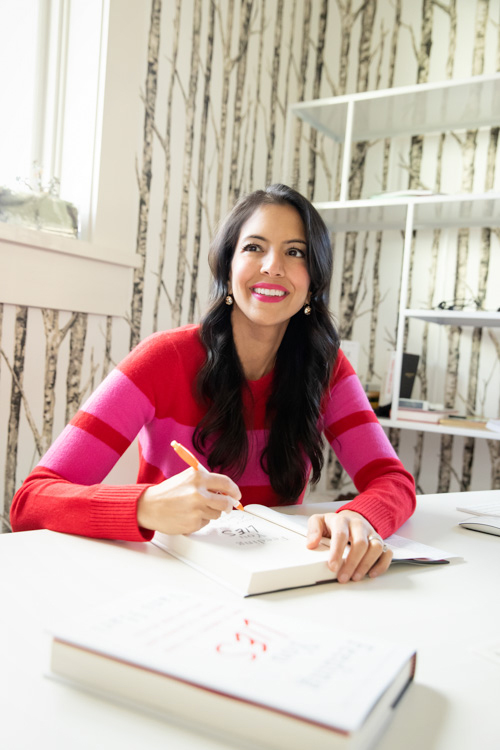
Kristen: So how did you finally say, Okay, that’s it, I’m going for it?
Vani: Well, it was right after I got a phone call and an email from the Chick-fil-A headquarters after I’d written about them. It was after that point where food companies started to contact me, and say…
Kristen: …Please go away. [laughing]
Vani: No, they actually asked me, how can we improve? We see that you’ve started a fire, we see that our consumers are concerned. What can we do?
A lot of food companies were actually very willing to invite me in and hear me out. That said, there were also many that didn’t. We had to invoke other measures like petitions to make that happen. It was shortly after that, when I realized I was taking time off work in my corporate job to fly to different food corporations to convince them to change their policies. That is when I realized that, Whoa, this is way more important stuff than what I’m doing at the bank. I soon recognized that the bank work was not my calling.
That Christmas break, I was traveling on that auspicious day (December 21st, 2012) where according to the Mayan calendar, the world was supposed to end. My husband and I were on top of Machu Picchu when I received an email from my boss informing me that my current project was ending. He asked me if I wanted to submit a proposal to continue being a consultant at that financial institution. I looked over at my husband and said Hey, I’m doing Food Babe full-time, I’m not doing this anymore. I expected him to say, how are we going to pay the mortgage? How are we going to buy our organic food? But instead he said, what have you been waiting for?
And in that moment, when I had his permission, I felt like I had permission from the gods and…
Kristen: …it had all lined up.
Vani: I got back from my trip in January and reality sunk in as I wondered: Now what? What am I going to do now? How am I going to survive? I need to figure out a way to make money doing this. I need to figure out what my next investigation is going to be.
As soon as I put 100% of my energy and focus on this passion, it opened up the Pandora’s Box of changes we were able to convince the food industry to enact.
It started with a petition that I began online to get Kraft to remove artificial food dyes. That petition went viral with hundreds of thousands of signatures. I went to the Kraft headquarters to deliver those petitions. Initially, they wouldn’t listen to us, but eventually they did.
Kristen: I have a list of some of your significant accomplishments in this arena.
You and your Food Babe Army have been responsible for getting Subway to remove the toxic chemical used in yoga mats from their bread. You got Kraft to pull food dyes from their mac and cheese products after you stormed their headquarters with 200,000 petitions. Chick-fil-A went antibiotic-free after you met with them. Anheuser-Busch and Miller Coors agreed to publish their ingredients. Starbucks removed a caramel coloring chemical from their Pumpkin Spice Latte. Chipotle did away with some GMO ingredients. And Panera Bread got rid of 150 artificial additives.
These are huge brands that people recognize and rely upon. When did you realize the power of your voice and that you could actually enforce change and hold these companies accountable?
Vani: I was growing increasingly curious about ingredients and sharing my experiences. For example, the reason I even began to look into Subway was because my friend Wes, who I worked with at my corporate job, ate it every single day for lunch. When he asked me why I wasn’t going there, I told him it tasted processed. He then challenged me to convince him why he shouldn’t go there.
Kristen: Game on!
Vani: Yes. I dug in and began to find out that they were using a chemical here in the United States in their bread, but not elsewhere across the world because it’s banned, because it’s very controversial chemical which turns into a carcinogen when it’s heated.
Kristen: I mean seriously, is that an ingredient we need in our bread?
Vani: When I started to write about these topics, much of it had never been written about before online. We also didn’t have social media to spread the message. I think that because my ideas were so new and so bold, and because I wasn’t afraid to just put it all in black and white, the community that was building out there really appreciated that. That community also lived up to the challenge of sharing it and making sure that the people they loved knew this information as well. This all grew organically.
The Food Babe Army is an amazing group of people that not only care about their own health, they care about everyone’s health. When the sharing went viral, it forced these companies to do something about it. We held them to task and as a result they could no longer could hide in this cloak of secrecy about what’s really in their food.
Kristen: This amazing book, Feeding You Lies, which is about to be hot off the publishing presses by the time we release this issue, is like you: it’s mighty and packs a punch. The thing that’s so remarkable to me is that you just call it all out.
But it’s not like you’re making unsubstantiated claims. You are doing the math for us. You’re calling out the names, you’re calling out the Big Food companies, you’re calling out the ‘front groups’, you’re calling out the people that are regulating or not regulating — and everything that’s going on in the underbelly of the food industry. It’s all there. You’ve basically assembled the roadmap for people to choose what they want to do with this information.
Let’s just say you’ve kicked a hornets’ nest that needed to be kicked. But these are undeniable facts and you’ve presented the documentation to prove it. Tell us about the copious end notes in the back of the book.
Vani: I went through hours upon hours of law review — not only because of my publisher, but to protect myself as well from any legal issues with the statements that I make in this book. I’m not only talking about ingredients and chemicals, like I did in my first book, The Food Babe Way.
This book is really about the manipulations and the tactics that the food industry uses in order to continue using chemicals in our food supply as they continue to convince us that their products are safe.
This book uncovers the behind-the-scenes information that you need to know as a consumer so that when you see a headline that says something, you can go through some investigation for yourself.
It’s important to discern who the experts are that are being quoted. Are these people being paid by the industry? Are these people part of ‘front groups’ or trade groups that actually represent the corporations and not our interests? I take the reader through each level of tactic that the food industry uses in their playbook in order to arm them with the knowledge of how to look for this stuff.
A great example of this that happened recently was the huge headline declaring that coconut oil is unhealthy. It was everywhere from the front page of USA Today to just about everywhere online. People were sharing this article voraciously because there has been such an increase of coconut oil users.
Suddenly, there’s this article that comes out stating that it’s unhealthy. And because it was funded by the American Heart Association, it got into every news publication. And because it was in every news publication, my Mother even saw it and started texting me. She proceeded to tell me, “I told you so.” She’s never liked the taste of coconut oil; she’s just a good ol’ butter fan. [laughing] So, I knew I needed to look into this.
What I found is that the two people who actually reviewed the studies had cherry-picked the information. They looked at saturated fat alone, not really looking at what coconut oil is — which is a completely different kind of saturated fat. And not only that, the canola and corn industry were paying them to advocate for them.
It’s imperative to look beyond these headlines that you see in the media about health and about declarations of what we should be eating. We can’t outsource our nutrition decisions to corporations that are using propaganda to make us buy their food.
Kristen: Isn’t it ironic that in this day and age of the information highway, it’s actually more confusing than ever before? We literally need to be forensic scientists and detectives to navigate our way through this. It’s become more complicated, not less.
Vani: Absolutely.
Kristen: Aside from outlining that trail for us, there are some big surprises in the book. One of the biggest ones is that not all research is equal and that we need to be skeptical. Let’s talk about ‘front groups’.
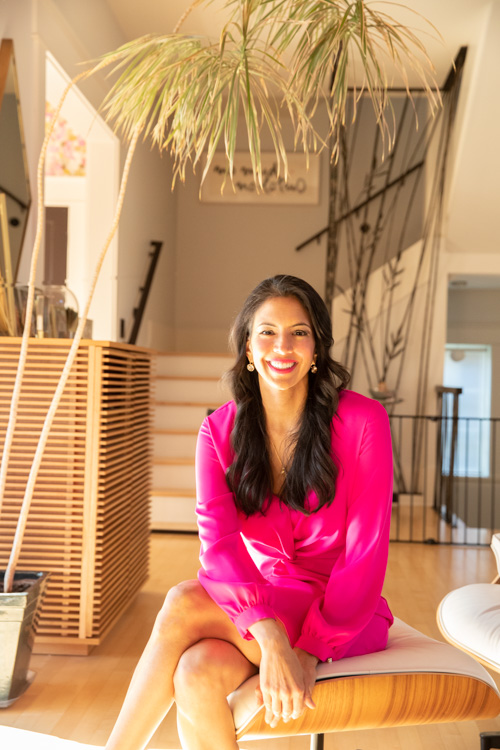
Vani: ‘Front groups’ sound very third party and independent. They have long beautiful names like the ‘American Council of Science and Health’. Initially you think that they are a non-profit organization that completely has your best interests at heart. When in all actuality, they’re being secretly funded by the chemical and food industry. And this happens all the time, not only in the food industry, but in a lot of different industries.
Kristen: The other thing that really killed me was finding out about the FDA. In the book, you state that the FDA claims that so as not to waste government resources, they will just let the manufacturer decide whether an ingredient is safe to use or not. So essentially, we cannot rely on the FDA to protect us and we certainly can’t trust Big Food to self-police.
Vani: There’s this assumption that all of the food on supermarket shelves is safe — that it’s been tested and that there’s some regulatory body testing these chemicals and making sure they’re all safe before they get into our food. No, that’s just not the case. Our FDA has said many times they’re not capable of handling that type of responsibility. They don’t even have the resources to do that, and the onus is actually on the food companies themselves.
And we see what happens when food companies are in charge. They do things like Kraft did, which is remove artificial food dyes for people overseas, where there’s a required warning label that reads: May cause adverse effects on activity and attention in children. Instead of doing the right thing here in America, they get away with the lack of regulation and continue to sell us these very controversial chemicals that could be affecting our kids’ health.
If we leave it to the food companies to regulate themselves, we are not going to be able to trust them with what I find the most precious thing that we have in our life: our bodies.
Kristen: Another frustration was discerning the whole GMO labeling debacle. I remember being excited recently to learn of regulation requiring the labeling of GMOs. And yet you call this out as a sham. In reality, it was the creation of a cryptic bar code system that made it virtually impossible for people to utilize unless they had a smart phone, unless they’d downloaded the app, unless they could access WIFI in the store. In other words, all the stars had to align perfectly in order to scan an item. Wouldn’t it have been easier to have a clear label on the product? It’s infuriating!
Vani: Yes, absolutely. It’s completely hidden. One of the things that I think is so important for people to recognize is about organic food — what it really means to be organic, and all the different levels of organic. And what it truly means to be non-GMO, and how you see these different labels at the grocery store and think you’re buying a better product.
The non-GMO label is a perfect example of that. This is a label that’s just taken off. Everyone sees a little butterfly symbol, or a non-GMO symbol, and they say, I’m going to buy that product. But what they don’t realize is that a primary reason we don’t want eat GMO foods is because we don’t want to eat the chemicals that are being sprayed on GMO foods.
In this country, predominantly, GMO foods have been designed to withstand heavy doses of Roundup — a chemical produced by Monsanto. One of the main ingredients in Roundup is Glyphosate, which is linked to cancer. Those GMO seeds are patented to withstand heavy doses of this — that’s the reason why I don’t want to eat GMOs. But what people don’t recognize is that non-GMO foods are also sprayed with Roundup.
Kristen: You’re still getting your Roundup one way or another.
Vani: Right. And that is the type of education that I want people to understand when they’re eating a certain way or buying a certain food at a grocery store. I want them to know what they’re actually getting, not just a label or fancy marketing that the food industry uses to get you to think that their food is healthy.
Kristen: In the book you said, “Do Americans care less about their health than people in other countries do? Some say so, however, I’d argue that if most Americans knew food companies are selling similar products overseas with healthier ingredients, they’d be outraged. I know I am.”
I was outraged just reading it, particularly to know that there are American companies like McDonald’s, who sell a certain kind of french fry here in the U.S. and a different kind in the United Kingdom. And that french fry in the United Kingdom has a lot of chemicals eliminated from it because the British won’t tolerate it due to their more stringent regulation. Let’s talk about that.
Vani: Here in the United States, there are a slew of chemicals that are allowed to be put in our McDonald’s french fries, and they do. And one of those chemicals is dimethylpolysiloxane, the same ingredient in Silly Putty.
Kristen: Because all french fries need that, right?
Vani: Exactly. It’s an ingredient that can be preserved with formaldehyde, so it’s not a really safe ingredient. In the UK, McDonald’s makes their french fries really basic: potatoes, oil, dextrose (which is just sugar), and then they add salt after it is fried.
This demonstrates how companies are getting away with the lack of regulation here in the United States. I think this is one of the most unethical policies that food companies have.
One of the reasons why they’re not allowed to use a lot of those chemicals is because in Europe and other places, they have a precautionary principle. They say you’ve got to prove these ingredients are safe before you’re allowed to use them. In the United States we have the opposite. They put the onus actually on the food companies, and the food companies are like, Oh well, it’s safe until we figure out it’s not safe.
Another perfect example of an ingredient that is used here and not elsewhere is BHT — an endocrine disrupting chemical. It’s one of the reasons why you see kids go into early puberty because they are being exposed to all these endocrine disrupting chemicals. BHT is also used in the liners of many cereals. General Mills uses it, Kellogg’s uses it, and they were using it here in the United States to preserve and extend the shelf life, but they weren’t using it overseas.
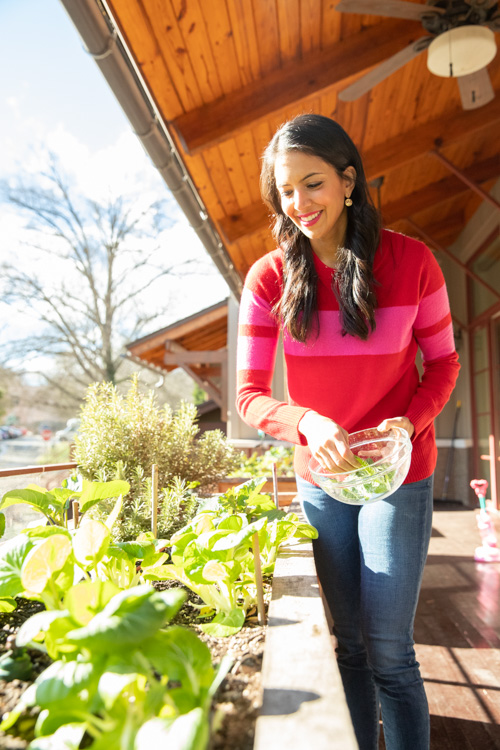
It was primarily just to improve their bottom line — to increase the amount of money that they’re making. They know that BHT is regulated overseas. And they know that it’s an endocrine disrupting chemical based on all the science that non-profit organizations have put forth. But they continue to use these chemicals. I feel that is something that definitely has to change.
I think food companies have a moral obligation to make their food as safe as possible.
Kristen: Not to mention that Americans spend 2-1/2 times more than any other nation on health care. Do the math.
Companies like Quaker Oats, Doritos, Heinz Tomato Ketchup, and Coca Cola are all different there and here. That’s just outrageous!
The onus is not really on the food companies, now the onus is on The Food Babe Army. So, let’s talk about the elephant in the room: the backlash.
You have been called everything from ‘crackpot’ to ‘fear monger’ and the New York Times even called you, ‘Public enemy number one of food companies’, which you took as a compliment.
Vani: Yes.
Kristen: But I don’t even want to make light of this because when I was reading the book I was thinking: She’s like the pioneer target of internet trolls. But this is very serious — and it goes way beyond the name calling. You’ve had death threats, rape threats, drive-by’s at your home, and of course, harassment by the beloved internet trolls.
Let’s start with them. Tell us what ‘internet trolls’ are and also what ‘astroturfing’ is.
Vani: When I was featured on the cover of Experience Life Magazineback in 2014, they had me fly out to LA and they treated me like a queen. It was the coolest thing ever.
Kristen: Let’s mention that they’re a wonderful magazine in the space of holistic health and conscious living.
Vani: I was on cloud nine that they would put an activist on the front of their magazine cover. And when it was released, I went to Barnes & Noble and picked it up. I was so excited, shared it with everybody, and was like, Hey, look at this, our mission is spreading. Look, it’s growing, this is so amazing, thank you so much for supporting me, and thanks to The Food Babe Army for it.
And then what happened was something I just couldn’t believe in my wildest imagination.
Though I didn’t realize this at the time, I finally figured out that anytime that I would share that I was going to be featured in mainstream media, there was a group of people online that would catch wind of it. They were all being organized by a PR firm and by corporate interests that were either pro-chemical or pro-food additive. It was a group of people that banded together online to make sure that whenever I was featured anywhere, they would attack the publication. They would attack me in the comments section and would completely overrun it with negative comments about me trying to persuade people to believe a certain thing about me.
They would claim that I’m a fear monger, I’m pseudo-scientific, or I have no scientific background — they would make all of these statements to try to attack me as a messenger and to discredit me. They actually did this to Experience Life magazine after I was on the cover. They took over their Facebook page and drove their 4.5-star rating on Amazon down to 2 stars with negative reviews.
Kristen: …and within days…
Vani: …negative ‘fake’ reviews appeared from these people who don’t even read Experience Life magazine. If they had read Experience Life magazine, then they wouldn’t be acting this way. People who read that magazine believe in real food, food without added chemicals, and want to hold food companies accountable. So, these negative reviews were all being driven by corporate interests.
It wasn’t until after my book came out and a lot of articles about it started to be published, that I began to understand that, Wow — we’re really affecting, millions and millions of dollars that the food industry is losing as a result of our campaigns. Of course they’ve got to try and stop us. Dealing with that backlash was very saddening to me. I didn’t know how to deal with it at first. I literally found myself looking on Amazon for books on how to deal with public criticism.
Kristen: Another book you’re going to have to write.
Vani: Oh, I want to write that book. I definitely want to write a book on how to deal with haters, because I learned so much through that process.
Kristen: And let’s just say that what you’ve been through is enough to shut anyone down.
Vani: Oh, yeah.
Kristen: You were also faced with the added pressure of knowing that it’s not just you. People who support you are also being punished. That’s the power of lobbyists.
Vani: They would online shame anyone who supported me. Not only if it was a magazine supporting me, or a media article supporting some of my accomplishments, it would even be if someone said, I love the Food Babe, here’s this article she wrote.Isn’t this interesting information? Everyone needs to read this. In the comments section you would see online trolls shame the person for sharing something from me, saying, don’t you know she’s an idiot? She’s a bimbo.
They’d make up everything they possibly could about me to take their focus or eye off the ball — anything to not talk about the ingredients of the food companies and all the unethical policies that are happening, or all the things that I’ve uncovered in investigations about the harmful ingredients in so many of these foods. They didn’t want the discussion to be about that. They didn’t want the discussion to be about the actual science.
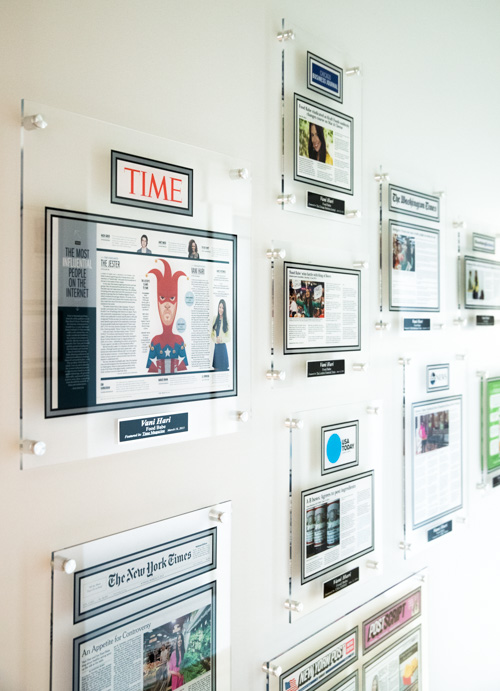
Kristen: They didn’t want the discussion to be about why we should be eating chemicals that are in yoga mats?!
Vani: No, they didn’t. And if they had, it would have been great because we would have had this lively debate and it would have been amazing. But instead, they ‘astroturfed’ my Facebook page that has over a million fans — so you can only imagine what a testament it shows about people who actually care about this issue. I took this as an acknowledgement of the threat I posed to the food industry: Oh my goodness, this person online has this many people that follow them, they really can get this message out very quickly.
They were very threatened by that…so much so that they had to do something about it. I didn’t understand the measures that they were willing to go through until I started the research for this book. Looking at the data and the research that I’d gotten from Freedom of Information Act requests, and getting emails that were literally public record…
Kristen: …which are in the book… and irrefutable.
Vani: Yes, they’re in the book — and emails from different experts that were quoted as the antagonists in all of these different articles. It was right there in black and white. These people were being paid by the very companies I was targeting.
Kristen: You have the names, the companies, the emails, the data, the trail.
People have the right to know the truth about what’s in their food. People have the right to know that they can heal. People have the right to know that their body has an innate ability to heal itself when supported.
Vani: Yes.
Kristen: The only other time that our magazine actually came in contact with this was with Dr. Kelly Brogan, who had the audacity [sarcastically] to tell people that they could get off their meds and heal themselves naturally. Now, to be clear, Best Self Magazine does not dole out medical advice, but we do try to spark conversation… 2-sided conversation about connecting the dots to your own life and to your own wisdom.
‘Astroturfing’ is a great name: fake grass, fake news, fake info.
Vani: It wasn’t something that I coined. A woman named Sharyl Attkisson does an amazing Ted Talk on astroturfing. She really explains what happens — and this doesn’t just happen with the food and chemical industry; it’s with every industry. They’re trying to do whatever they can to try to hide the negative effects of their industry and weave the message that they want to weave in to the public.
Kristen: Masterful marketing — the ultimate spin.
So how have you stayed the course? How have you not thrown in the towel?
Vani: It has been very hard. There have been points in time where I wanted to — when I was going through a lot of this backlash in the media and I was trying to convince these reporters to look into these ‘experts’ — to recognize that they’re being paid by the food industry. They would say, Hey, we asked them and they said no.
Kristen: …and we asked the company if this food was healthy and they said yes. [sarcasm]
Vani: Exactly, right? So, the first thing I did is turn off Google alerts, because no matter if someone said something nice about me or negative about me, I didn’t want it to affect my daily work.
I had to remember why I started all this to begin with. I didn’t want anyone to feel like I used to feel. I did want people to learn that the way the food industry markets themselves is to get us to do one thing — and that is to get us to buy their food.
Kristen: Again, and again, and again.
Vani: Yes, again and again. Whether it means creating addictive additives with flavorings that I talk about in the book or getting us to buy into some healthy marketing message.
The majority of chemicals that have been invented in the last 50 years have only been invented for one sole purpose: to improve the bottom line of the food industry. These foods are still being sold all over the place. My work will not be done until everyone’s eating real, whole, nutritious food.
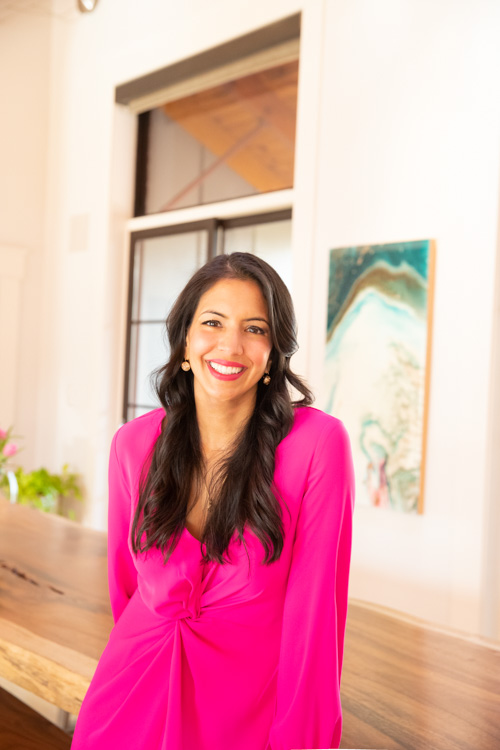
Kristen: So now that we have this information, what are we supposed to do with it? What’s our big take-away given all this confusion?
Vani: It’s funny because food is not that complicated. The only people that have made it complicated are the food scientists that have created all of these different processed foods. At the end of the book, I take the reader through a very simple exercise, which I call ‘The Three Question Detox: Three Questions That Will Transform Your Health’. It sounds so simple when I describe it, but it will have such a profound impact on what you’re eating if you just ask yourself these three simple questions every single time you’re choosing what to eat.
The first question is: What are the ingredients? You’ve really got to understand what you’re eating. You’ve got to know every single ingredient that you’re consuming, and if you don’t know the ingredient, I want you to put the product away.
The second thing to ask yourself is: Are these ingredients nutritious? You may be aware that there’s natural flavor in your product, or that there’s some preservative in your product, or there’s an emulsifier like Guar Gum in your product — but I want you to ask, Is that ingredient nutritious?
You’ll start to make these connections in your head, and you’ll start to see that there are a lot of ingredients that you’re eating every single day that aren’t nutritious. They’re just there to improve the bottom line of the food industry, or to create some texture or mouth feel, or some uniformity, or to improve the shelf life of this product. It’s not for our health.
And then the third question: Where do these ingredients come from? Do they come from a laboratory and a chemical factory that food scientists have created? Are they coming from cows at a factory farm that are fed growth hormones and raised on routine antibiotics that fatten them up? Where’s your food coming from?
Once you start to ask yourself these three fundamental questions every single time you go out to eat, or sit down to eat, or are cooking your food and looking at what products you’re bringing into your house — you will make better choices.
Kristen: You also give lots of suggestions, empowering us to claim our own voices to demand food regulation and food transparency, to sniff out the truth, to look at who’s funding the research, and I love this one — to follow the money and vote with your dollars.
Vani: Yes!
Kristen: You said if we were all eating ‘real’ food, the Big Food companies would be out of business.
Vani: They would!
Kristen: You have a young child who is so fortunate that she’s being fed real food which is going to give her a great advantage in her health going forward.
If you could wave a magic wand in this food arena, what would you wish for?
Vani: People always ask me what I am going to do when my daughter goes to school.
Kristen: Go with her, of course! [laughing]
Vani: They tell me she’s not going to have your fridge and your pantry there. Sure, she might take her lunch, but she’s going to have lots of other options, right? Wouldn’t it be great to just magically wave my wand and change all of school food to be whole, nutritious food — in all schools everywhere?
Kristen: Amen — from your mouth to school kitchens across the country! Oh, that’s a good one.
Segueing from that delightful image, I want to talk briefly about Truvani and how your work has led you to this. I’m going to pull some of these products out of my goodie basket so you can tell us more about them.
Vani: For so much of my career I’ve been fighting the food industry from the outside, but I really wanted to figure out a way to inspire the food industry from within. One of the things that I’ve always felt was necessary was to truly understand how foods are manufactured behind the scenes, to understand all the dynamics involved. You have to get that knowledge before you’re really able to understand the food companies’ point of view, what their capabilities are, what they can change, and how fast they can change.
One of the things that kept happening when I would find a product that I loved is that it would start to change. And low and behold, what I found is that a big giant company would buy up one of my small, favorite organic companies and suddenly the ingredients would start to change.
One of these products was actually my turmeric supplement. I started to see all these fillers were being added and that’s when I said to myself: Wouldn’t it be great if I could just create my own turmeric supplement — and my own products that I know are from the best source possible?
The truth is that I’ve always had this desire and vision, I just didn’t know how to make it happen. Finally the right people came into my life and we made it happen. It has been amazing — one of the things that I say every single morning when I wake up is, I can’t believe I’m doing this!
It’s also a tremendous responsibility. I’m not just presenting information now, I’m creating products for people. I’m creating alternatives. It has been such an incredible experience of learning about the food industry…
Kristen: Literally from A to Z.
Vani: I thought I knew a lot, but I’ve learned way more in this last year about what’s really happening behind the scenes. It’s strengthened my resolve to eliminate even more processed foods from my own diet because of the contamination within the supply chain. This even applies to some organic foods.
We have created the cleanest protein powder on the market; the chocolate version has six ingredients, the vanilla has five.
Kristen: This is like Christmas on the couch. [pulling products from the basket]
Vani: Not only are these USDA Certified Organic, we also test for heavy metals. We were testing for heavy metals for pea protein and every single pea protein source that we came across was failing our lead test. Failing repeatedly. We actually went through 52 different suppliers before we found a clean version of pea protein that hadn’t been contaminated.
So knowing that this is happening out there, and knowing that I was consuming a lot of different other brands…
Kristen: …thinking it was healthy.
Vani: Yes, thinking it was clean, and healthy, and safe. Are these other brands going through these types of rigorous tests? A lot of them aren’t. So it makes me really proud to know that I’ve created a company that truly believes in the safest ingredients. And we don’t believe in any unnecessary ingredients either.
I’m always getting pitched by our manufacturer and others to consider ingredients that will extend the shelf life, etc. One of the things that I’ve always wanted to create is a bar, and we just haven’t been able to do it yet because it would just too expensive. I can’t sell everyone a $15 bar. But we’re still working on that.
I have an enormous amount of pride in these products. Each one of these was created out of my own necessity, things I needed in my life. Like this chicken bone broth. It’s something that I would make from scratch every month and freeze in different Ball jars. I would thaw them for my daughter to drink, especially if she got sick. And I would travel with it packed it in a Yeti cooler.
I realized that this is a lot of work! Not everyone can do this. No one has the time to do this. I barely did, but I knew how important it was. And that’s when I envisioned how great it would be to have an organic chicken bone broth powder that you could travel with anywhere, that you could sip with hot water. That’s why we created this.
Kristen: And tell me about this. [holding Marine Collagen powder]
Vani: Marine collagen is amazing. I’m turning 40 in just a couple months. The collagen production in your skin goes down every single year that you age. Collagen is the thing that keeps wrinkles away.
Kristen: Where was this 10 years ago? [laughing] I need to drink this. [holding up entire bag]
Vani: I know. And it’s something that many skin companies have tried to put into their products to apply topically. But they’ve noticed that it doesn’t absorb in the body as well as when you drink it.
Kristen: This is exciting information! How much do you recommend we take?
Vani: There’s a small scooper in there to take daily.
Kristen: And what’s this one?
Vani: This is the vanilla protein. I think this is probably my favorite product because it tastes so good and it literally only contains five ingredients that you recognize, that you would use in your own kitchen.
Kristen: What a concept!
Plus I have to comment on this beautiful packaging. Congratulations on this venture, Vani.
Vani: Thank you.
Kristen: Truvani seems like such a natural evolution for you.
Before we go, I want to give a shout out to ‘The Food Babe Army’. In honor of your collective work, I’d love it if you would read a portion of the Food Babe Army mission, so that people can truly grasp your collective goal and vision.
Vani: Absolutely.
Our mission is to create a healthier world, full of the most nutritious, safe, and wholesome food, to feed ourselves and our families. We create public awareness about what’s in food, how to make the right purchasing decisions at the grocery store, and how to live an organic lifestyle in this over-processed world.
We inspire change in the food industry beginning within our local communities and expanding into the largest worldwide food corporations. In demanding that food manufacturers and retailers provide organic and nutritious food, we open the door for a greater supply of good, affordable food in a world around us.
Collectively we have the power to change the world.
Kristen: That says it all. I don’t know who can argue with that.
Thank you for tirelessly staying the course on this bumpy road. We’re all the better for it. Congratulations on your success, and on this incredibly eye-opening book. I think this is going to make a huge splash and shine a light on a path that needs to be shone upon.
Vani: Thank you so much. I am forever grateful.
